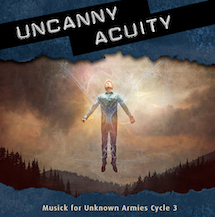The Sound of the Unknown Part 3: Creating the Music
To celebrate the release of our three suites of Musick for Unknown Armies, composer James Semple wrote three blog posts about commissioning, collaborating on, and creating music for roleplaying games. This is the third post in the series.
 Often when starting a new project I will try and define my palette, the range of instruments and sounds that will be used for the music. Sometimes this will be definitive but often it will just be the core sounds. With Unknown Armies I didn’t really do this. Instead, I defined the kind of sounds I’d gravitate towards but I’d begin my template afresh on each track. This definitely ended up being more work but I feel that it kept the tracks sounding more original and unique.
Often when starting a new project I will try and define my palette, the range of instruments and sounds that will be used for the music. Sometimes this will be definitive but often it will just be the core sounds. With Unknown Armies I didn’t really do this. Instead, I defined the kind of sounds I’d gravitate towards but I’d begin my template afresh on each track. This definitely ended up being more work but I feel that it kept the tracks sounding more original and unique.
There are a whole lot of influences on the Unknown Armies music but it never really sits comfortably in a single, definable genre. For instance there are orchestral and choral sounds in there, but they're usually mixed with synthesizers or strange abstract noises, and often contemporary drums or bass. Even the alternative rock tracks include soundscape elements and unusual production tricks.
Most of the music was realised within a computer and honestly I used an enormous number of different virtual instruments to create the three suites. I also used a fair amount of live guitar, sometimes overtly and often as an effect in the background. I played acoustic, clean electric, distorted electric, slide guitar, reversed guitar — pretty much anything I could think of, really. It all went in there. I also used the wonderful cellist Deryn Cullen on the track "Lament for the Incorrectly Processed." The cello was so exposed and sensitive that I knew I needed a live player and her sublime performance truly lifted that track.
One reason I love working on RPG music is the chance to help define a genre and put a stamp on an original setting. The setting here was so original that I had a massive amount of freedom to come up with something new and I’d like to think that now Unknown Armies has its own musical identity.
If you haven't already, check out The Sound of the Unknown Part 1: Commissioning Music and The Sound of the Unknown Part 2: The Collaboration Process, the first and second posts in this series.
 Often when starting a new project I will try and define my palette, the range of instruments and sounds that will be used for the music. Sometimes this will be definitive but often it will just be the core sounds. With Unknown Armies I didn’t really do this. Instead, I defined the kind of sounds I’d gravitate towards but I’d begin my template afresh on each track. This definitely ended up being more work but I feel that it kept the tracks sounding more original and unique.
Often when starting a new project I will try and define my palette, the range of instruments and sounds that will be used for the music. Sometimes this will be definitive but often it will just be the core sounds. With Unknown Armies I didn’t really do this. Instead, I defined the kind of sounds I’d gravitate towards but I’d begin my template afresh on each track. This definitely ended up being more work but I feel that it kept the tracks sounding more original and unique.There are a whole lot of influences on the Unknown Armies music but it never really sits comfortably in a single, definable genre. For instance there are orchestral and choral sounds in there, but they're usually mixed with synthesizers or strange abstract noises, and often contemporary drums or bass. Even the alternative rock tracks include soundscape elements and unusual production tricks.
Most of the music was realised within a computer and honestly I used an enormous number of different virtual instruments to create the three suites. I also used a fair amount of live guitar, sometimes overtly and often as an effect in the background. I played acoustic, clean electric, distorted electric, slide guitar, reversed guitar — pretty much anything I could think of, really. It all went in there. I also used the wonderful cellist Deryn Cullen on the track "Lament for the Incorrectly Processed." The cello was so exposed and sensitive that I knew I needed a live player and her sublime performance truly lifted that track.
One reason I love working on RPG music is the chance to help define a genre and put a stamp on an original setting. The setting here was so original that I had a massive amount of freedom to come up with something new and I’d like to think that now Unknown Armies has its own musical identity.
If you haven't already, check out The Sound of the Unknown Part 1: Commissioning Music and The Sound of the Unknown Part 2: The Collaboration Process, the first and second posts in this series.
